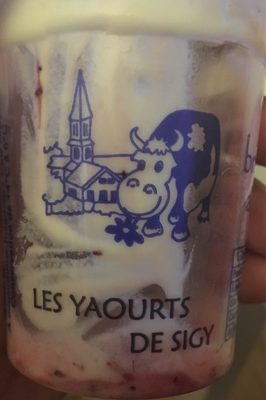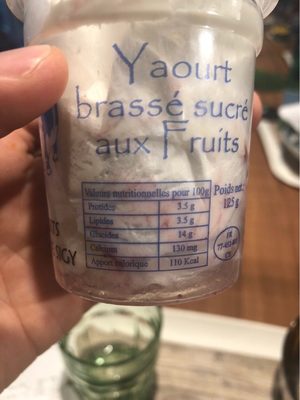Yaourt brassé sucré aux Fruits - Yaourts de Sigy - 125 g
This product page is not complete. You can help to complete it by editing it and adding more data from the photos we have, or by taking more photos using the app for Android or iPhone/iPad. Thank you!
×
Barcode: 3760012450039 (EAN / EAN-13)
Quantity: 125 g
Brands: Yaourts de Sigy
Categories: Dairies, Fermented foods, Fermented milk products, Desserts, Dairy desserts, Fermented dairy desserts, Yogurts, Stirred yogurts, Fruit stirred yogurts
Traceability code: FR 77.452.001 CE - Sigy (Seine-et-Marne, France)
Countries where sold: France
Matching with your preferences
Environment
Carbon footprint
Packaging
Transportation
Report a problem
Data sources
Product added on by kiliweb
Last edit of product page on by roboto-app.
Product page also edited by arianed20, geodata, openfoodfacts-contributors, teolemon, yuka.SEpBeVBmb2N0S2cwd3NZYzJ5UFQxZHdzeXJhVFdGeTdKT2NSSWc9PQ, yuka.U1l3UkVhdGFpL2dZdzhFenBUQ095dlJ3OXFINVlFZXRjN1VXSWc9PQ, yuka.UnZzZE5LSmEvUEpicHRodTR4ZlJ4TTlrK0lPTFQyZUZDdkV4SVE9PQ, yuka.VnJveEFwMForOTRZbjhRbTdETHJ5NHhyMzRTeVpIUHRLc0VESVE9PQ, yuka.YXZBSkNJNDRwOFlVaS9BMHhBbUxwZDUvNnJ5TVJ6KzBCUHBQSVE9PQ, yuka.YmZvWUVxNCt1T2tEbjgwenhSRHhwTXBXNjZDSVcyaWJEdEJMSUE9PQ.










